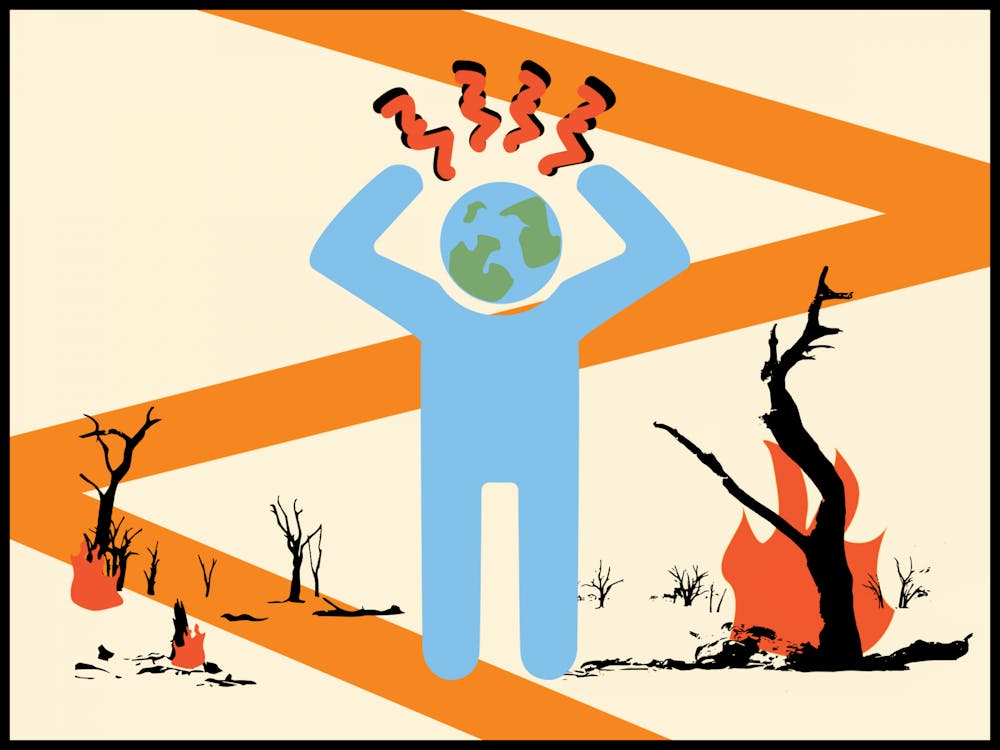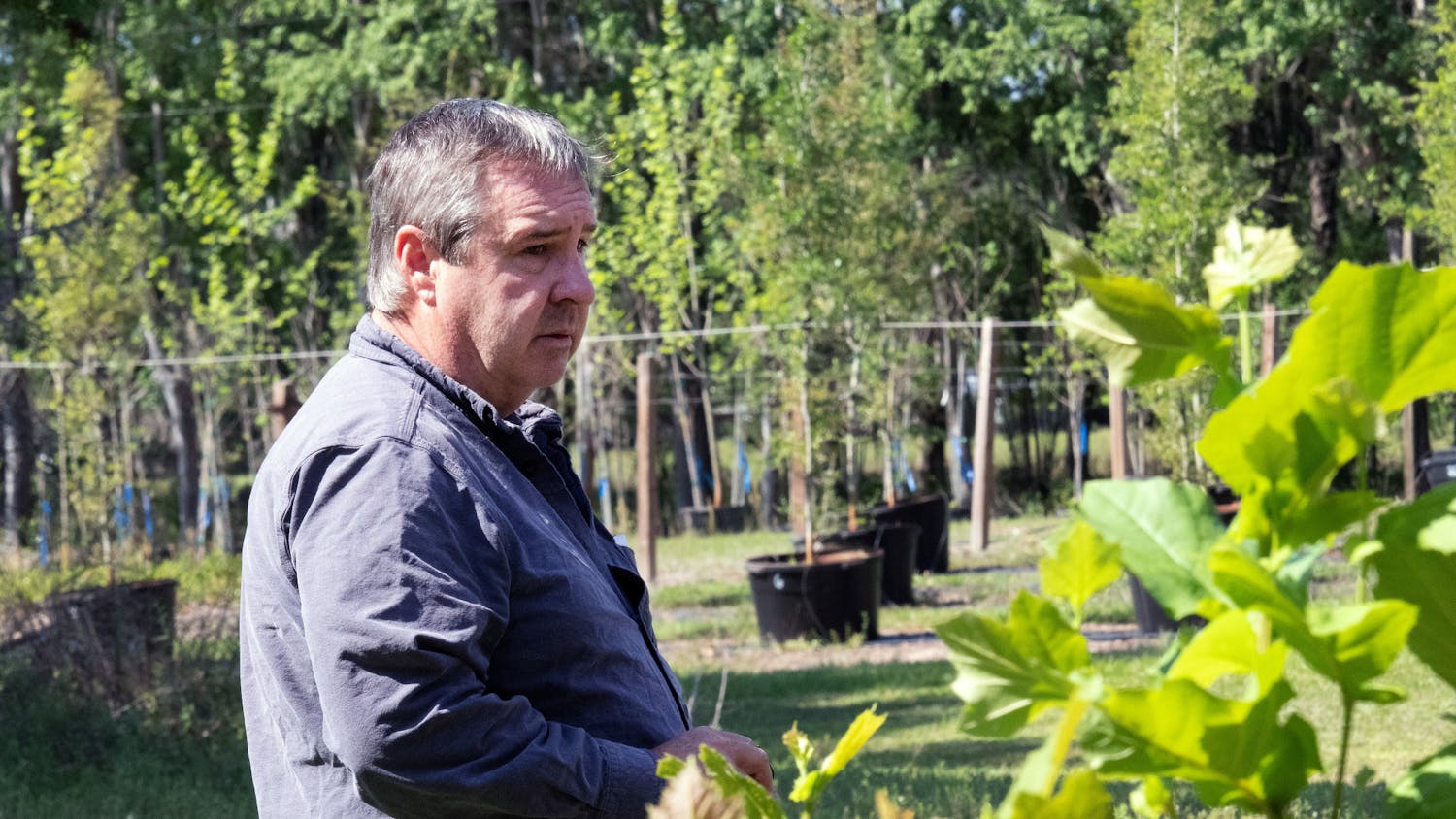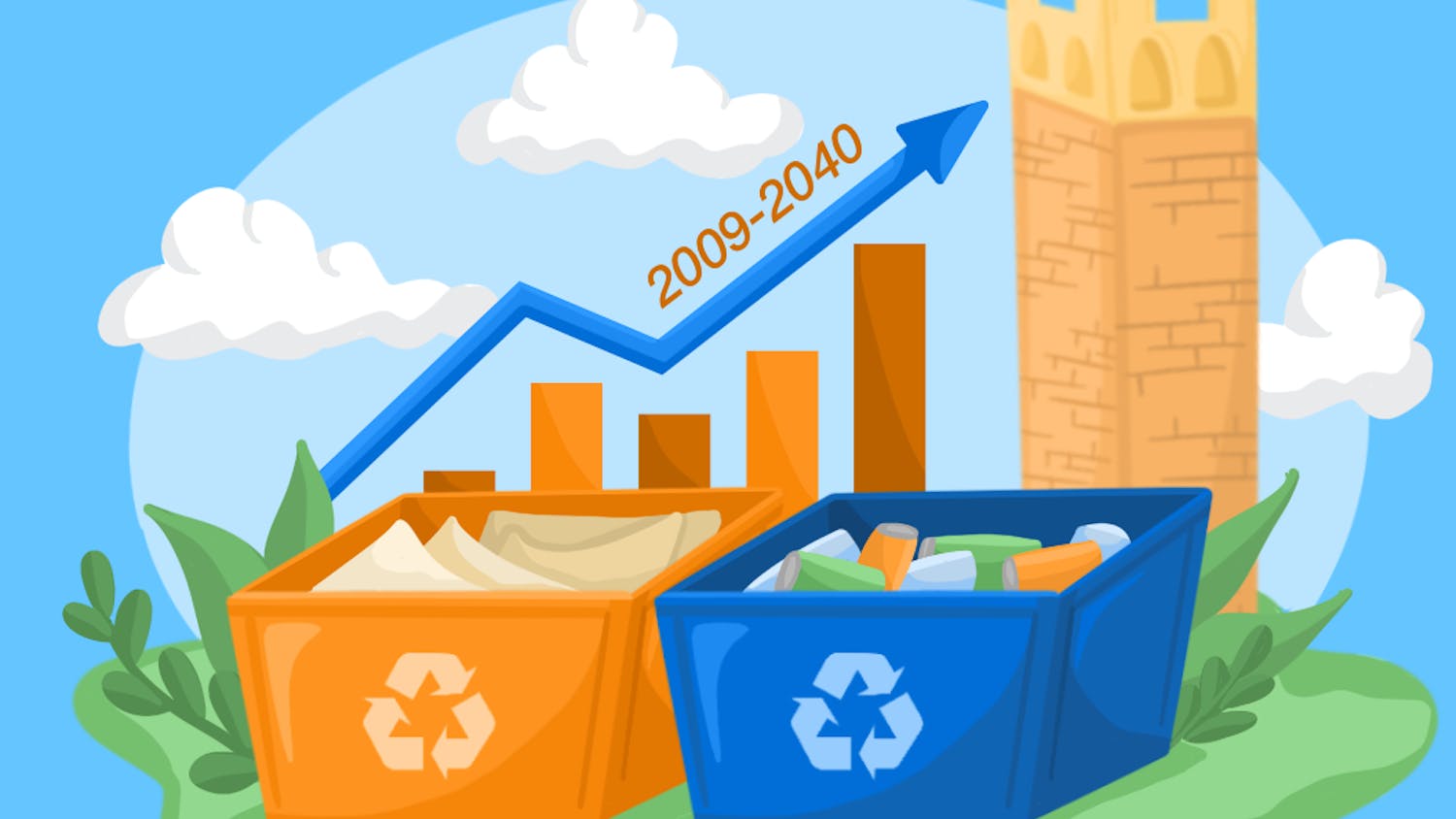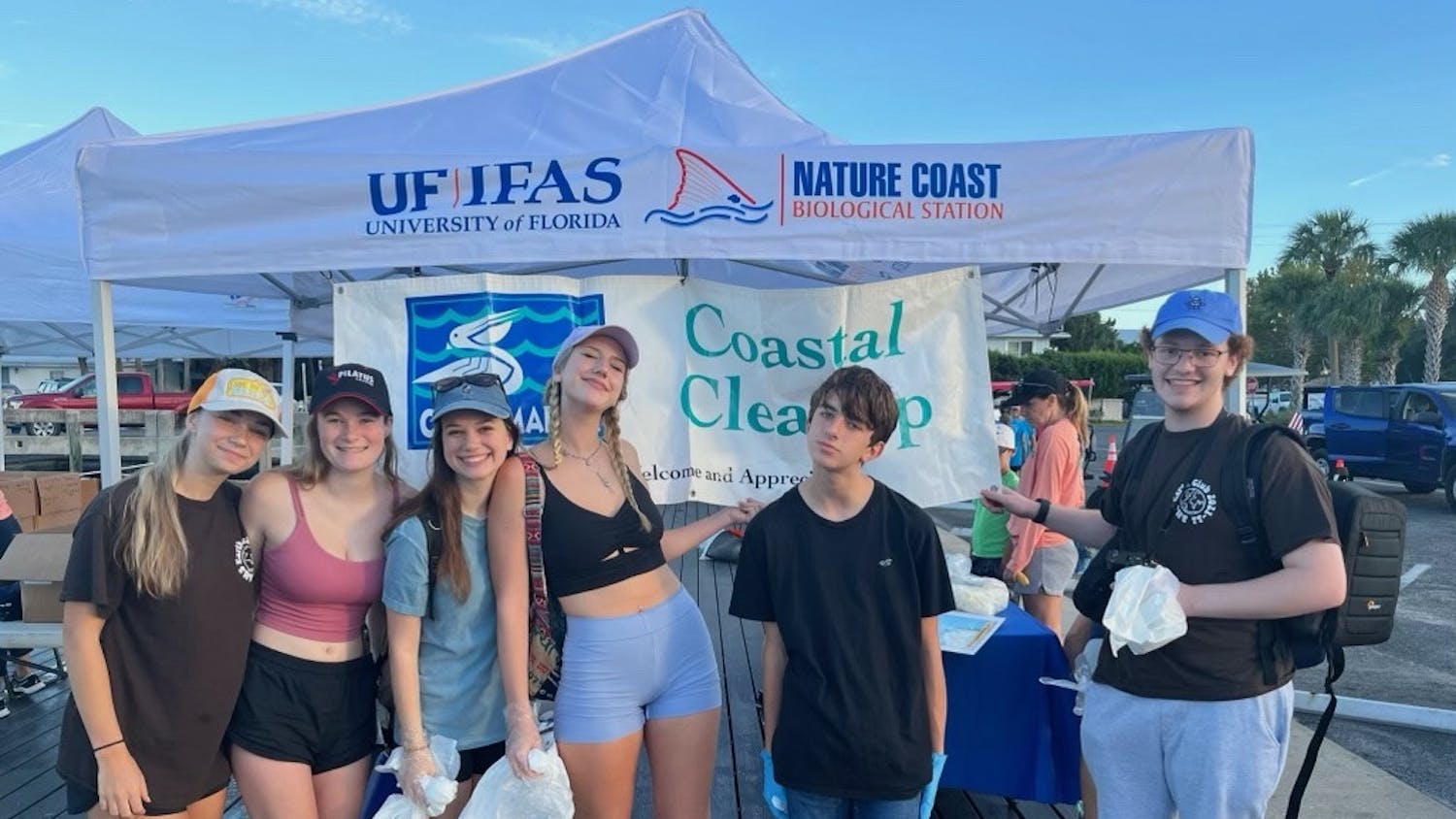When Elise Turesson dives into the murky, duck-weed-covered water of Manatee Springs, she marvels at sunlight breaking through the surface. She’s found a love in diving, but not every experience is as rewarding.
Over time, the environment has declined, and the effects are noticeable.
“A lot of the damage has already been done,” Turesson said. “But it doesn't mean that we can't make a change right now.”
In 2020, the U.S. experienced 22 separate weather and climate disasters of which damage exceeded $1 billion, according to the National Oceanic and Atmospheric Administration.
A total of 226 people died in the 2021 historic cold wave that struck Nebraska southward to Texas and left millions without power. Hurricane Ian, the deadliest hurricane to make landfall in Florida since 1935, killed 149 people, displaced thousands more and decimated city infrastructure in southwest Florida.
With forests on fire, hurricanes gaining strength and regularity and other natural disasters becoming more frequent, members of Generation Z wonder: What does our future look like? What will be lost? What’s possible for the future?
Climate anxiety is defined as “heightened emotional, mental or somatic distress in response to dangerous changes in the climate system,” according to the Climate Psychology Alliance’s Handbook of Climate Psychology; or “a chronic fear of environmental doom,” as defined in a 2017 American Psychological Association report.
Turesson, a 20-year-old UF nutritional sciences sophomore and president of Gator Scuba, has been diving since she was 16 years old. Turesson is a dive master candidate for UF Scuba, UF’s scientific diver development program, and she dove every single weekend during the Spring semester.
She’s watched the coral reefs in Florida digress over time, Turesson said. Some corals in Florida are suffering coral bleaching — when coral expel algae and turn completely white — putting the corals under more stress and subjecting them to mortality.
“In Florida, if you're diving in the ocean, the reefs are not as good as they used to be,” she said. “Over time, It just gets worse and worse.”
Florida’s freshwater springs, some within a one-hour drive of UF, are also degrading over time, Turesson said. But she feels they’re better preserved than the oceans.
She struggles with climate anxiety, she said, feeling like she can’t do enough to curb the planet’s deteriorating conditions.
“It's upsetting to see people walk around and litter and just do things that are not helping and just hurting a lot for the environment, especially when you care so much,” Turesson said.
Institutions like California Institute of Integral Studies offer climate psychology certificates, which are designed as additional training for professional counselors. The EcoPsychology Initiative is another company that provides climate anxiety training and certificates. A certificate is not required to provide treatment, currently.
Brittany Rivers, a 37-year-old licensed mental health professional in Gainesville, joined the Climate Psychology Alliance in August 2022.
It’s a term that’s still being defined clinically, Rivers said, though it has more of a focus on the fears around the human-caused impacts of climate change.
The term is used synonymously with eco-anxiety, a term relating to how a certain weather event may impact someone’s living environment and livelihood. Climate anxiety can be a subset of eco-anxiety, Rivers said, which is more expansive.
Much of the anxiety Rivers sees involves the unknowns about the future, especially in young adults.
“It's a natural reaction to a threat,” she said. “A major threat.”
Guilt is another reaction many may have to climate change, but it’s only helpful to a certain degree, Rivers said. The emotion can quickly turn into inaction and may not be helpful.
“It's important to think about what is accessible to you in your life and what is sustainable for you,” she said. “We're looking for things that can give you kind of a sense of self-efficacy [that] helps you feel like you are doing something that matters.”
Therapy is all about finding a balance that works for the patient, Rivers said. However, climate anxiety is a new topic and doesn’t have a standard procedure; it isn’t in “The Diagnostic and Statistical Manual of Mental Disorders, Fifth Edition,” the handbook that mental health professionals use to diagnose disorders.
Sixty-seven percent of Gen Z is somewhat or extremely anxious about the impact of climate change on their mental health, compared to only 42% of baby boomers, according to an APA poll.
Mental health professionals go about treatment in different ways, but common themes include giving space to process emotions, finding spaces and groups that provide support to the patient and encouraging a reconnection to nature, Rivers said.
Grieving is another route some therapists may take. This process can help clarify what is meaningless and what is worth devoting time and energy to, she said.
“We might be spending a lot of time and energy trying to save something that has already been lost or trying to recreate a world that is not possible anymore,” Rivers said. “Grieving can help us to move through those losses to create new possibilities or to imagine new possibilities.”
A more intimate form of eco-grief is solastalgia, which describes the experience of chronic distress or longing due to negative or distressing changes to the home due to the impacts of climate change.
Some UF students have experienced such grief.
Grace Johansson, a 19-year-old UF natural resource conservation sophomore, is Gator Scuba’s secretary, a dive master candidate for UF Scuba and an intern at the Florida Springs Institute. She’s been diving regularly for the past two years, primarily at the springs.
Manatee Springs used to be full of thriving plant life and living snails, Johansson said. Now, it's desolate.
“It's just a snail graveyard because the water quality has changed so much, and the snails can't live and the plants can't grow,” she said. “And that goes for a lot of springs.”
Groundwater pumping is one environmental issue that’s causing anxiety. Private companies, like Nestlé, extract millions of gallons of groundwater per day for a couple of hundred dollars, she said.
When groundwater is pumped too fast, the water can’t be replaced quickly enough, leading to reduced flow in the springs, she said.
“Springs don't really exist anywhere else like they do here,” Johansson said. “They’re completely unique.”
Adrian Santiago, a 22-year-old UF senior majoring in sustainability and the built environment, is the president of Students for New Urbanism, a club advocating for new urbanist principles.
The club, with roughly 27 members, focuses on urbanism regarding the built environment — campus design, building cities, integration of public transit and building with the climate in mind.
“I have a sense of urgency with regards to my career, as far as the choices I made,” he said. “I've been told from a very young age, ‘Hey, your generation has a big mess to clean up.’”
It’s disturbing that decision-makers and political figures will not validate climate change, he said. UF President Ben Sasse, for example, once denied the human effects on climate change when he voted against an amendment that said humans contributed to climate change, Santiago said.
SNU Secretary Stephen Badea, a 21-year-old UF political science and linguistics senior, also struggles with climate anxiety. His anxiety isn’t detrimental to his mental health, he said, but climate change is something he thinks about every day.
Badea came to the university to study political science, but it wasn’t until he started taking climate change classes and studying in Europe that he realized he wanted to go into environmental policy, he said.
“I realized that this is the problem that needs to be solved before all others,” he said. “Economics, health care, education — all of that is going to go down the drain if we don't stop climate change because civilization will literally collapse.”
If the U.S. were to implement European practices, such as solar and wind farms, there would be a noticeable change, Badea said.
But when it comes to climate change, Badea has a lot of questions running through his mind: Will our politicians actually do something about it? Are they going to stand up to entities like the fossil fuel industry and not put profits before people? Is our water going to be clean? Are we going to have access to food?
Badea wonders how Florida will survive climate change. He wonders how everyone will survive — if everyone will survive.
Climate change will be felt by everyone in some way. Summers will get hotter, winters will intensify, fires will increase and hurricanes will become more common. People who deny climate change will soon sound insane, he said.
“The bottom line is that we haven't reached the point of no return yet — we still have so much potential to turn things around. That should give you the hope that you need in order to continue moving forward,” Badea said. “Take action for your future.”
Contact Ella at ethompson@alligator.org. Follow her on Twitter @elladeethompson.
Ella Thompson is the Spring 2025 Editor-in-Chief and a fourth-year journalism major. She also worked as the Fall 2024 Digital Managing Editor and the Spring 2024 metro editor. In her free time, she can be found reading, planning a trip or journaling.






